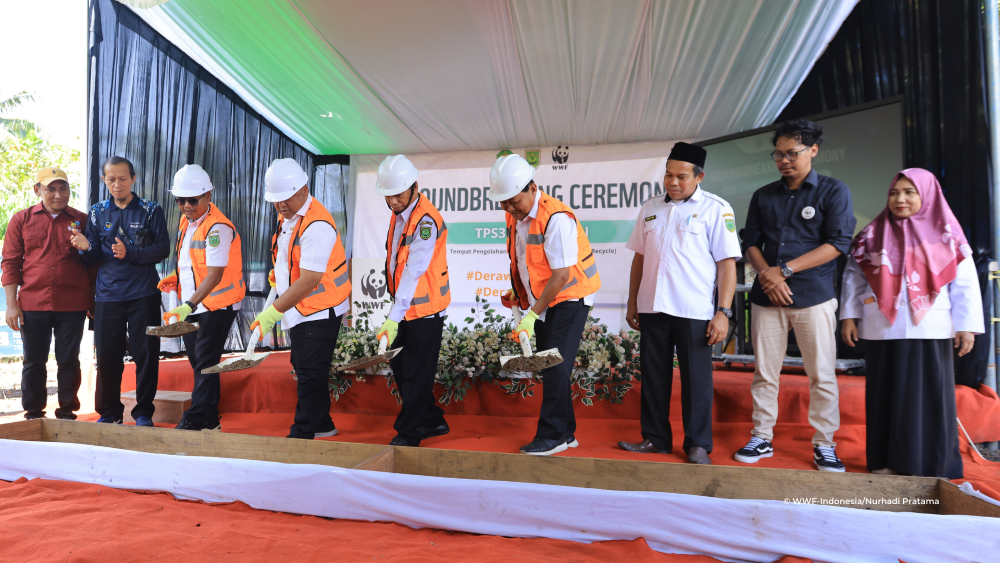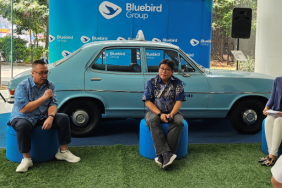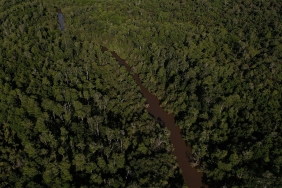"RUPIAH" MARKS DERAWAN'S TRANSFORMATION INTO A SUSTAINABLE NATURE TOURISM DESTINATION
Derawan, September 15, 2025 - "RUPIAH" or Rumah Pilah Sampah Derawan is a TPS3R that was inaugurated for waste management on Derawan Island, East Kalimantan. "Rupiah" was inaugurated by H. Gamalis, SE, Vice Regent of Berau Regency, East Kalimantan, Indra Mahardika, Head of Derawan Island Village, WWF-Indonesia, and the local community. The construction of this TPS3R was supported by WWF-Indonesia to realize Derawan as a sustainable nature tourism destination.
Derawan Island has come a long way in realizing a global and sustainable nature tourism destination. However, the rapid pace of tourist visits to Derawan Island certainly also produces other impacts, namely high waste production. For the record, during the Christmas and New Year holidays in 2024, there were 3,271 people visiting Derawan or 600-650 tourists per day. Records from the Berau Regency Central Statistics Agency (BPS), the number of tourist visits to Derawan Island District, both foreign and domestic, reached 34,160 in 2024.
The number of visits certainly has an impact, one of which is waste generation due to tourism activities. Waste generation in Berau Regency itself is recorded to be quite large, with a daily amount reaching 144.47 tons and an annual accumulation of up to 52.732.10 tons (SIPSN, 2024) Of these figures, Derawan Island also contributes significantly through tourism activities, according to WWF monitoring data, the average total non-household waste generated reaches 46,105.1 kilograms per day-an astonishing figure for a small island with an area of only 44.6 hectares, even though Derawan Island is within a marine conservation area that has a diverse and protected marine ecosystem.
The Ministry of Marine and Fisheries (KKP) has a national target in reducing plastic waste in the sea, which is carried out in stages by 50% until year 2029, and also the target of the Ministry of Tourism and Creative Economy (Kemenparekraf), which is the Clean Tourism Movement from Derawan Island. So these two ministries are very committed to contributing by taking concrete steps through the master plan document, waste management, and construction of 3R (Reduce, Reuse, Recycle).
To realize both national and regional government targets, H. Gamalis, SE, Vice Regent of Berau, also said, "Berau's tourism opportunities and challenges need to be considered, especially not only from infrastructure and other supporting facilities. However, the direction of environmental studies is also important, especially in supporting the convenience of cleanliness." He continued, "The existence of representative waste processing such as TPS3R is expected to be sustainable. So not only on Derawan Island, but also becomes a pioneer to be realized in other tourist destinations in Berau Regency, while maximizing existing waste to be recycled so that it can be of economic value to the community ".
This TPS3R is named RUPIAH (Rumah Pilah Sampah Derawan). Occupying an area of 20 x 20 meters with a core building measuring 15 x 10 meters, this building is expected to encourage integrated waste management on Derawan Island, starting from upstream. RUPIAH has main facilities such as a sorting room, a recycled material warehouse, and an organic waste processing room.
"The construction of this TPS3R is a form of our joint commitment to keep Derawan Island clean, beautiful, and sustainable. We want to show that tourism and environmental sustainability can go hand in hand," said Indra Mahardika, Head of Derawan Island Village.
This initiative is the result of an analysis contained in a master plan developed by WWF-Indonesia and the Berau Regency Government, where 80 non-household buildings-including hotels and restaurants-operate to serve tourists and residents by 2023. However, their presence does not escape the waste generation that averages 11.16 tons per year, all of which is transported to a temporary landfill in Tanjung Batu sub-district.
The construction of this TPS3R was marked by a traditional Bajau tribal ceremony and groundbreaking by the Berau Regency Government, the people of Derawan Island Village, and WWF-Indonesia. This facility is expected to preserve the environment and support sustainable tourism. This initiative is also expected to become an example and education center for waste management in other small islands in Indonesia as a responsible tourism destination.
In addition to infrastructure, the TPS3R will encourage and facilitate active community participation in responsible management through training and communal management, one of which is the involvement of cleaning operators and local leaders (local champions). WWF-Indonesia also supported TPS3R operations by handing over operational support equipment such as tricycles, personal protective equipment, waste press machines, recycling waste boxes, special bags for waste sorting. Information boards about the types of plastic waste, the cost of plastic waste, and the sorting flow at TPS3R have also been placed at five strategic locations, namely at Kiani Beach, the pier, the Kuda Graveyard tourist spot, the village head's office, and at the TPS3R location later. This information board aims to make it easier for the public and tourists to contribute to waste sorting on Derawan Island.
Candhika Yusuf, as Marine Biodiversity Conservation Lead, WWF-Indonesia, said, "There have been studies that found all green and hawksbill turtles on Enggano Island, Bengkulu, contained plastic (Purnama et al., 2025), and global studies show microplastics were detected in all turtle species studied (Duncan et al., 2018). These findings emphasize the need for serious efforts to reduce marine debris to protect key species and community livelihoods."
Through this initiative, it is expected to increase community participation in waste management in accordance with the mandate of Law No. 18/2008 and PP No. 81/2012. So that in the future, RUPIAH is expected to become an example of a waste management model in Indonesia's small islands as a clean, healthy, and sustainable tourist destination.
Documentation:
https://drive.google.com/drive/folders/13vs29JJVKP0D1tlLhVuNkwyOHKzGhr5i?usp=sharing
***
For more information:
Karina Lestiarsi, Communication Officer WWF-Indonesia
klestiarsi@wwf.id / 0852-1816-1683
About WWF Indonesia Foundation
WWF-Indonesia is a civil society organization with a local legal entity and a global network, supported by more than 100,000 supporters. Our mission is to stop the degradation of the earth’s natural environment and to build a future in which humans live in harmony with nature by conserving the world's biological diversity, ensuring that the use of renewable natural resources is sustainable, and promoting the reduction of pollution and wasteful consumption.
For the latest news, visit www.wwf.id and follow us on X (Twitter) @WWF_id | Instagram @wwf_id | Facebook WWF-Indonesia | Youtube WWF-Indonesia pollution and overconsumption.





